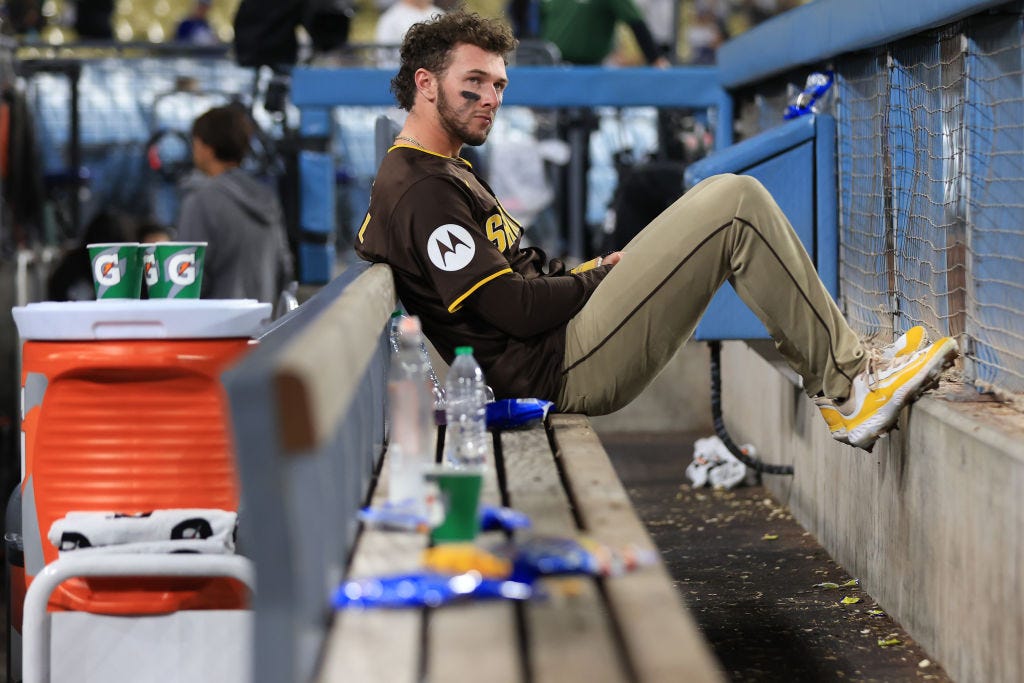How Worried Should We Be About the Padres?
It's not great (!) that one family member is publicly blaming another family member for the team's failure to sign Roki Sasaki

Hi friends-
A quick reminder: next Tuesday February 11th (a week from today) I’ll be hosting the great Howard Bryant at my house to talk about his terrific Rickey Henderson book from 5:30-6:30 PM PT. This discussion will be held over zoom for all paid subscribers, and you’ll be able to ask Howard any questions you’d like about Rickey, Black players in MLB, Oakland, the book writing process, etc. Don’t worry if you haven’t had time to read or finish the book. Just come for a wonderful chat celebrating the life and legacy of Rickey with a man who knew him as well as anyone. All paid subscribers are welcome. If you’re not a paid subscriber and you want to upgrade in time for spring training, you can do so here:
On October 27, 2009 I was sitting at my computer at a Days Inn (or the equivalent) in Omaha or Des Moines or some place off I-80 on a cross-country assignment for Glamour Magazine. Six days before that, the Dodgers were eliminated by the Phillies in the NLCS for the second year in a row.
With the exception of a few sips of playoff coffee from 1989-2007, the Dodgers had been mediocre for two decades, winning 52% of their games and losing 48%. They won their division twice, captured the NL wild card twice, and were summarily trounced in those four playoff appearances 12 games to 1, with three sweeps.
But then in the early aughts, they drafted Matt Kemp, Russell Martin, Chad Billingsley, Jonathan Broxton, and Clayton Kershaw and traded a bag of baseballs for Andre Ethier. Then they signed a roided up Manny Ramirez and starting winning. And in the ‘08 and ‘09 playoffs they swept the Cubs and the Cardinals out of the NLDS, respectively, before meeting the Phillies both times in the championship series.
Philadelphia—a much better team—blew them out of both NLCS matchups, four games to one each year. And yet, the Dodgers core was young and trending in the right direction so it was hard to be discouraged.
Kershaw was only 21 years old in 2009 and had just developed the slider that would make him a first ballot Hall of Famer. Kemp, Ethier, Billingsley, and Martin were all about 25 and earning minor duckets. True, the Jacksonville Five weren’t yet good enough to win a championship on their own, but the Dodgers seemed primed to make a run with controllable cheap talent all reaching their prime together. Maybe they could spring for a pitcher like Cliff Lee or CC Sabathia to help them over the top and into the World Series in 2010.
Then on October 27, 2009, Jamie McCourt—who owned the Dodgers with her husband, Frank—filed for divorce. I don’t remember which middle America city I was in when that news came off the wire, but I remember knowing immediately that whatever momentum the Dodgers had was over. Done. Finished. And that it would be a long time before they would win the World Series, likely with a crop of different players.
I got up from the motel desk and walked over a freeway overpass to a gas station to buy Oreos and Pringles and eat my feelings.
It wasn’t just that the McCourts were divorcing. It was that the tenor of their filings was so nasty and each of their claims to the Dodgers so “mine! mine! mine!” that I knew the team was cooked. Since there is no possible way to split a baseball team in half, and it was clear that neither of the McCourts wished to ever be in the same room together again without a judge and bailiff keeping them from killing each other, it became obvious the team would be held hostage until the divorce was finalized and they were both pushed out. Had one of the McCourts been allowed to hold on to the team I don’t believe the Dodgers would have had any of the success they’ve enjoyed over the last decade.
I was of course more right than I could have known at that point. The divorce became so acrimonious, the dysfunction so toxic, that the Dodgers were forced to file for bankruptcy because the McCourts did not have enough cash to make player payroll one Friday. Mercifully, MLB stepped in and forced the McCourts to sell the team to the owners that fans of every other team are mad at now for spending too much money. (I wrote a whole book about this if you’re interested).
Anyway, I mention all this now because I’m getting the same vibe from the family that currently owns the Padres, only it might be even worse. (As far as I can remember, neither of the McCourts ever accused each other of racism or sexism in court filings).




